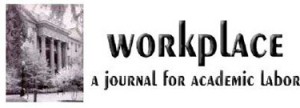FROM THE EDITOR
In its more than decade of existence, the Rouge Forum has attempted to contribute to the conversation on social justice within national organizations, in union halls, in K-12 schools, in colleges/universities, at work places, and in community organizations. It has attempted to bring a reasoned analysis to contemporary issues using an historical lens, a sense of the total, and, often, pedagogical strategies. It has produced an appreciable amount of scholarship among its members—sometimes award winning scholarship—and has among its membership winners of academic freedom awards.
Undoubtedly, the Rouge Forum has become a relevant voice for social justice, particularly related to education. We hope to amplify that voice and continue to develop its relevance in the days to come. Recent events, tethered to their historical predecessors, indicate there is little time to dither.
One of the best things about the Rouge Forum, particularly those who have been able to take part in conferences and joint actions, is the sense of community. My partner and I remarked a few years ago at the conference in Detroit that we felt like we were home. We were among comrades who, while we didn’t agree on everything, seemed to have a congruent idea that things need to change and a relatively common idea of what that might look like. We could at least outline the picture.
Times together, such as these, assure us we are not crazy—that another world is not only necessary, but possible. Our work is continuing to figure out how we support one another, how we can have a voice in our particular locations, and how we craft and apply a vision of what is more just, more human, and right. Community. Voice. Vision. Connect reason to power, as Rich would say. Go.
And in that go-ing, we need sustenance for the journey—sustenance in the form of community and consciousness (ever-deepening, ever-evolving), but also hope. The hope I/we suggest is not naïve hope. It is hope grounded in struggle, connected to others. It is hope that is participatory. It becomes the essence of who we are. It is a politics of prefiguration that suggests if we want democracy and we want justice, then our actions, to the extent possible, will need to bear these out. It is to understand the journey/struggle not as precise, but as punctuations of imperfections, of hypocrisies that bring us back to the start, such that we can begin again.
This idea of the politics of prefiguration is espoused by a thoughtful theorist on hope: Rebecca Solnit. Her text, Hope in the Dark, pushed me to find hope in the struggle—in fact, catapulting me into that struggle. Solnit has enlivened that sense again in her recent essay in TomDispatch entitled Learning how to Count to 350. Re-citing a history of action in the streets and reasons to hope (in the face of all the reasons to despair), Solnit suggests, “To survive the coming era, we need to re-imagine what constitutes wealth and well-being and what constitutes poverty.” Considering the dismal performance of communism in the 20th century (often more totalitarian and capitalist than liberatory) and the fact that global capitalism was brought to its knees last year, she suggests we’ve got work to do to (re)imagine the world.
And, we—that is, people of conscience—must occupy that void. Else, something else will. The steel-toed rhythm can be heard goose-stepping just inside the ear’s horizon. I submit we’ll need to step into that space sooner than later.
I’ll see you at the barricades.
We’ll have to resist what is more than likely coming next—find a voice, speak truth to power, take to the streets, take over a building. Escalate. Extending Rich’s metaphor from earlier work, we lambs look good to the wolves who regroup in the penthouses of their nearby woods (whose fuel is nearly spent) and in the corporate board rooms overlooking ever-drying creeks (more parts pollution than potable). They’re finished buying what we have, as how much more cheaply can our labor power be had? Now, they plan to just take it.
And, they will use a god to convince you they are right. They will call on him, attempting to scheme us into doing the same (a little deposit of flesh now, and your children’s flesh, for an eternity of made-up bed time stories, “Now I Iay me down to sleep….”).
I’ll keep my soul, whatever is left of it, thank you very much.
I’m looking, instead, for what Solnit calls a moment of creation—moments for which democracy, social justice, creativity, freedom, take one step forward.
Solnit is good at flipping the script, looking at the underside of the paper and seeing the scribbling of possibility. What she submits is an alternative read to the corporate media prophets (or is that profits?). We would do well to listen. Hers is not a naïve re-rendering or postmodern apologetics. My take is that Solnit’s proposition is grounded in the real. The alteration takes into account the work that is being done, often diminished by our popular discourse and corporate media. This alternative understanding helps us realize that others are struggling, voices are shouting, a history of resistance leads us to this moment of possibility.
Revolutionary praxis remains our guide: the simultaneity and dialectic of self change and the changing of society.
We should understand what it’s going to take for that moment of creation. Those moments: when we realize the politics of divide and conquer have gotten the best of us (color/class/gender/sexuality-coded inequalities); when we realize that we that we are killing others (bought and paid for bombs with our signature on them), killing babies, mothers, difference with our own babies barely able to know differently in capital’s schools (the militarization of schools); when we realize that our knowledge has been regulated by corporate interests to keep us docile and ignorant (high-stakes testing) in order to prepare us for jobs we will more than likely hate (alienation) so we will seek pleasure in (fetishize) commodities, that is, things, and our social relations will be mediated by reality TV and video games.
Try Wendell Berry’s recent poem on for size at your upcoming holiday celebration to bring the above into sharp relief. You may not be invited back (which may or may not be a bad thing…)
When we recognize these issues as material reality, a moment will emerge. A moment (consciousness grounded in the real) that must lead to another moment (courage to change) in which we will need to figure out how to live differently (protest, resistance, occupation, freedom schools, sustainable living, new solidarities). Moments in which we own our labor power: the free development of each creates the conditions for the free development of all, since we will all recognize our interdependence and the strength of our difference.
More than likely, these moments will blur–because the barricades will not only be in the streets, but they will be in our work places, in our schools, in our churches, in our homes, in our community centers. Consciousness will merge with courage will merge with consciousness will merge with a more materialist understanding of reality, which will lead to how we can re-imagine wealth, well-being and poverty in the coming era.
We must. The wolves are hungry.
But, the lambs are plentiful. And, we will realize that we far outnumber the wolves when conscious because we will see and do differently.
When we see differently, we won’t be divided so easily. When we see differently, we won’t abide by mystical explanations of injustice; we will see it for what it is. When we see differently, we’ll stop looking at the deadness of the center and instead explore the possibility at the periphery. When we see differently we won’t believe the mythology of national holidays intended to white-wash history and to, more importantly, mark the beginning of a new holiday season of debt and guilt built by the capitalists. Just look on the rez. How did Thanksgiving work out for those who welcomed the newcomers? Can we call it what it is, please: a celebration of genocide. And, we are still killing them (see the December, 2009, Harper’s Magazine article about life on the modern reservation). Christmas could use an RF News issue all its own…
When we see differently, we will note the possibility of solidarity born in moments of creation where we understand richness as fullness (of life and community), in the bread broken amidst laughter AND tears, in the totality discovered, in one more sunrise.
The Rouge Forum seeks this fullness.
Struggle. We must. Eyes open. Spirit fully engaged. Hands ready for the work.
See you at the barricades…
…On the way to the barricades, might I recommend a choral reading of this quarter’s Rouge Forum News? Our 15th issue has another exciting line-up of essays, which are broken up by other provocative reading: poems by Gina Stiens and Colin Ross, Rouge Forum broadsides, an editorial from Paul Moore, and art from Bryan Reinholdt. I’d recommend making posters of it. And T-shirts.
We have two featured essays in this issue, one from Wayne Ross, which takes up the issue of patriotism, the other, a timely piece from Mary Barrett, Maria Hornung, Amber Kelly, and Katy Sutton, which looks at the possibility of medicine as a human right.
In our section on war and militarism, Travis Barrett reports on three aspects of institutionalized oppression, and what we might do about it, and Matt Archibald analyzes zero-tolerance, neoliberal ideology, and the growing militarism of our society.
In our schooling and curriculum section, Rich Gibson sets us straight on the way to analyze/critique the current takeover of US schooling by the elite; Nancye McCrary, Doug Selwyn, and I chronicle various approaches we’ve taken at our universities to promote democracy; and Delana Hill applies Paulo Freire and dialogical action directly to her classroom.
As always, we look forward to your feedback, either directly (arenner@bellarmine.edu) or at our blog: www.therougeforum.blogspot.com.
Adam Renner
Louisville, KY

 Follow
Follow
